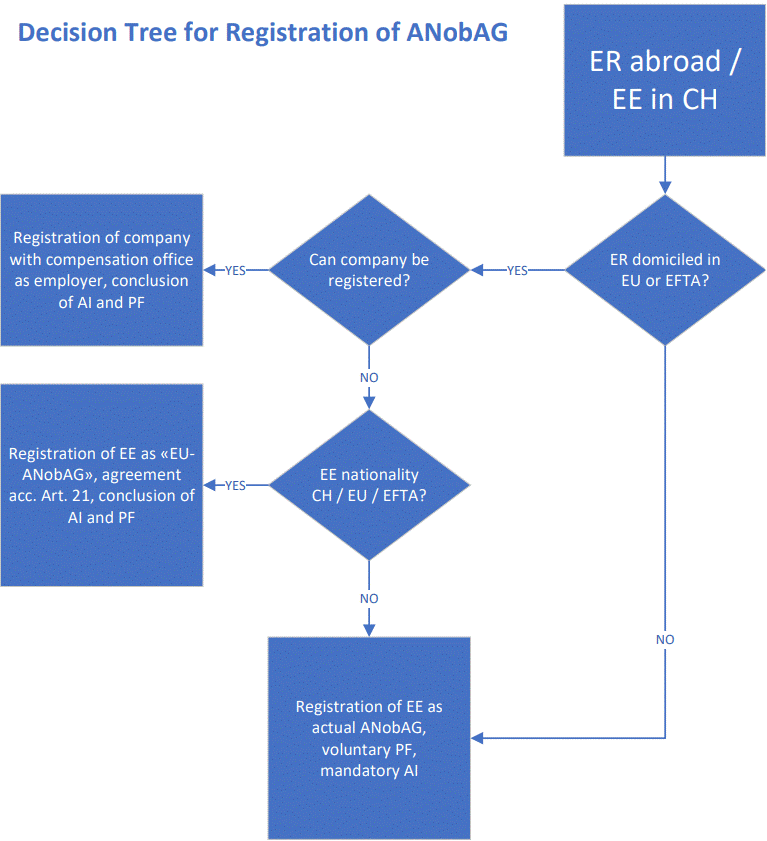If foreign companies without a Swiss entity hire local employees in Switzerland, these are called “ANobAG” and are subject to Swiss social security.
Pitfall ANobAG
In the past years, a trend has emerged which has also been promoted by hindered travelling due to the pandemic. Foreign companies without a Swiss entity hire individual employees in Switzerland, so-called ANobAGs, employees without an employer liable to pay contributions in Switzerland.
These employees work from home or at clients’ sites. Even though the employer is domiciled abroad, they are subject to Swiss social security. Hence, they must be registered and insurances must be concluded. However, depending on the place of domicile of the employer or the citizenship of the employee, the registration is different.
David Oberson
Partner, Location Leader Lausanne, Head of Accounting & Payroll Services (APS) Switzerland
KPMG Switzerland
The decision tree below can help with the determination of the proper registration process.
If you need assistance, we can support you with our payroll outsourcing services.
 ANobAG registration decision tree | ER: employer, EE: employee, AI: accident insurance, PF: pension fund
ANobAG registration decision tree | ER: employer, EE: employee, AI: accident insurance, PF: pension fund
Employer domiciled in EU or EFTA
If the employer is domiciled in the EU or EFTA, probably the easiest solution is to register the foreign company itself as employer with the compensation office and to conclude the necessary insurances in the company’s name. This is possible thanks to the bilateral agreements between Switzerland and the EU or the EFTA Convention, respectively. Only a mailing address in Switzerland is required. The advantages of this solution are that the applications and contracts can be concluded relatively easy, all contribution invoices will be in the name of the employer who can settle them directly. In case of staff changes, it is not necessary to undertake all registrations again. The foreign employer must keep a payroll according to Swiss regulations, deduct social security contributions from the salary and prepare the required year-end declarations.
EU-ANobAG
However, sometimes, foreign entities do not want to register in Switzerland. In this case, the employee him- or herself must be registered as ANobAG. If this employee is a Swiss, EU or EFTA citizen, special rules are applicable. Often, such employees are referred to as “EU-ANobAG”. In addition to the registration as ANobAG, the Agreement pursuant to Article 21, para. 2 of the Regulation (EC) No. 987/09 must be concluded. In this agreement, the parties agree that the employee is responsible for the payment of social security contributions. Nevertheless, the employer remains liable towards the compensation office. In addition, at least the mandatory accident insurance and pension fund must be concluded.
Employer domiciled outside EU/EFTA or employee is not a CH/EU/EFTA citizen
Matters become more challenging if the employer is not domiciled in the EU or EFTA and/or the employee is not a Swiss, EU or EFTA citizen. In this constellation, the only possibility is to register the employee as an actual ANobAG with the respective compensation office. The employee becomes responsible to pay social security contributions. Respective invoices will be issued to the employee directly. Moreover, the conclusion of a pension fund is voluntary. If the employee wants to join a pension fund on a voluntary basis, the only option is to register with the Substitute Occupational Benefit Institution (AEIS). The accident insurance according to UVG is mandatory, but it is difficult to find an insurance company that is willing to offer such an insurance policy.
In addition, it is advisable to conclude a clear agreement, preferably in writing, between the employee and employer about the portion of contributions that the employer will bear and how the reimbursement of premiums to the employee will be handled. Otherwise, discussions are inevitable, at the latest when the first contribution invoice arrives.
Further points to consider
It is important that the necessary insurances are in place by the start date of the employment, due to liability issues on the employer side and because the process would become more difficult otherwise. For example, joining a pension fund retroactively is usually possible, but insurance companies are not willing to conclude a pension fund if the respective employment has already been terminated in the meantime. In this instance, the compulsory affiliation with the Substitute Occupational Benefit Institution (AEIS) is the only remaining option. Therefore, an early initiation of required steps is recommended.
Another specialty is that ANobAGs are not subject to withholding taxes, even though they would be according to their resident status. Instead, they are taxed according to the ordinary tax regime because there is no debtor of a taxable benefit in Switzerland (art. 4 abs. 1 QStV).
Apart from social insurance, fiscal implications should also be taken into consideration. For example, the risk of a foreign company creating a permanent establishment in Switzerland as this would have an impact on corporate taxes as well as withholding taxes.
In our experience, foreign companies are usually not able to process such employees on their own due to the lack of knowhow. Therefore, they are well advised to obtain guidance from a local expert like us.


